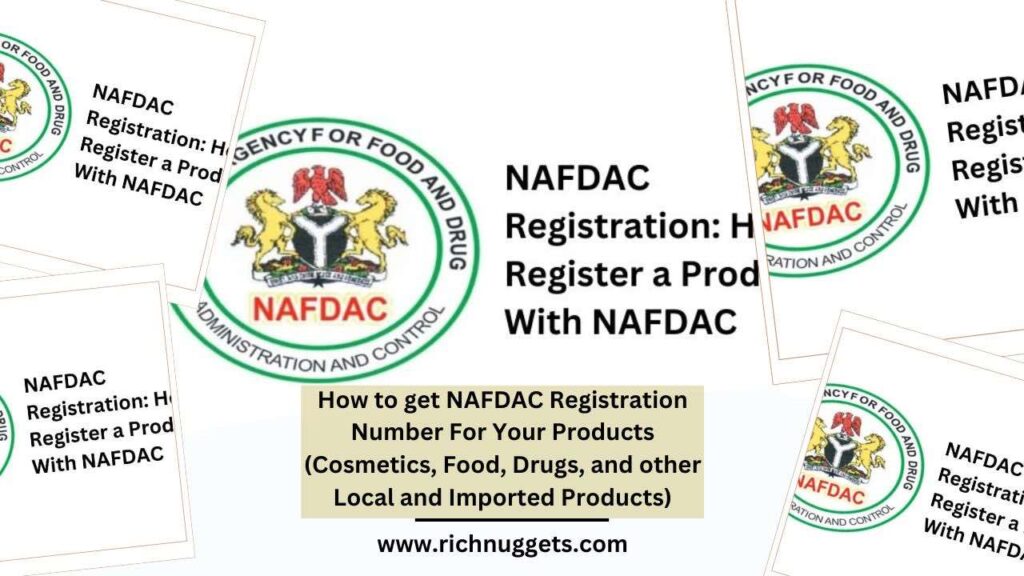
NAFDAC stands for the National Agency for Food and Drug Administration and Control, which is a regulatory agency in Nigeria responsible for ensuring the safety and efficacy of food, drugs, medical devices, cosmetics, and chemicals.
The NAFDAC Registration Number is a unique identifier assigned to products (locally made and imported) that have been approved by NAFDAC after meeting the necessary regulatory requirements.
This number signifies that the product has undergone evaluation and is considered safe for consumption or use within Nigeria.
It helps consumers and regulatory authorities track and verify products in the market not only to ensure compliance with safety standards but to fight against fake and counterfeit products.
In this article we wont only be discussing how you can get the NAFDAC number, but also the importance, the durations, cost and many other intricacies.
Table of Contents
The Registration Process To Get a NAFDAC Number:
To obtain a NAFDAC Registration Number for regulated products, applicants must follow a structured process outlined by the National Agency for Food and Drug Administration and Control (NAFDAC).
Here’s a step-by-step guide on how to register NAFDAC regulated products:
- Application Letter: Prepare a written application on the company’s letterhead addressed to the Director-General of NAFDAC, specifically to the Director of the Registration and Regulatory Affairs (R & R) Directorate at the NAFDAC Office Complex in Lagos State. Purchase and complete an online application form for product registration via http://registration.nafdac.gov.ng.
- Submission of Documents: Applicants are required to submit all necessary documents for registration along with an application letter, adhering to the guidelines provided by NAFDAC.
Here is the list of documents needed to be submitted for NAFDAC number registration
- Evidence of Business Incorporation or Business Name Registration if the business is within the MSMEs.
- Site use Agreement (Where applicable)
- Proof of payment to NAFDAC.
- Contract Manufacturing Agreement (if applicable).
- Brand Name Registration Evidence with the Trademark Registry.
- Evidence of satisfactory inspection or Good Manufacturing Practice (GMP) certificate for product line.
- Product labels/artwork.
- Comprehensive Certificate of Analysis on a letter-headed paper from the Quality Control Laboratory, containing specific information about the product.
- Food handlers certificate / medical fitness certificate for production staff, this should include the following: Sputum test, stool test, Urinary test, WidaI test, and Hepatitis B test (Only for the food industry).
- Facility Information and Inspection: Provide relevant information and a description of the facility to be inspected by NAFDAC, especially concerning the registration and importation of regulated products.
- Sample Submission for Laboratory Analysis: When notified by NAFDAC, submit samples of the products to be registered for laboratory analysis.
- Timely Payments: Ensure all payments related to the registration process are made promptly according to the relevant guidelines, tariffs, and fees.
- Complete Documentation: Ensure all documents submitted are complete and accurately described to avoid unnecessary delays in the registration process.
- Timelines for Registration:
- Food product registration is not more than 90 days from the acceptance of the application.
- Drug and cosmetic products registration is maximum 120 days from the acceptance of the application.
- Variation of product registration doesn’t exceed 60 days.
- Compliance Directive (CD): Compliance with any directives issued by NAFDAC within 7 days is mandatory. Failure to comply may lead to the cancellation of the application, and any client delays will not be counted within the specified registration timeline.
- Complaints Resolution: Any complaints or conflicts should be directed to NAFDAC’s reforms unit through designated email addresses ([email protected], [email protected]) or the nearest NAFDAC state offices.
- Summary of Registration Processes with Timelines:
- Submission of Application: 0 days
- Document Verification: 10 days
- Facility Inspection/Sampling: 10 days for Food, 20 days for Drugs and Cosmetics
- Laboratory Analysis: 30 days for Food, 40 days for Drugs and Cosmetics
- Final Vetting: 10 days
- Approval Meeting/Issuance of NAFDAC Registration Number (Certificate of Registration): 20 days
Total number of days: 90 days for Food, 120 days for Drugs and 120days for Cosmetic products
Important Notice:
- Non-compliance may lead to application disqualification or significant processing delays.
- A successful application results in a NAFDAC Certificate of Registration valid for five years.
- Each NAFDAC registration number is for a single product. If you have more than one product, you will have to get a separate registration number for the product.
- Registration does not automatically grant an Advertising Permit; a separate application is required for advertising.
- NAFDAC reserves the right to revoke, suspend, or modify a certificate during its validity period.
- Filing an application or paying a fee does not guarantee registration status.
- Timely response to NAFDAC queries is crucial; failure to respond within 90 working days will lead to application closure.
- The timeline for product registration, from submission acceptance to registration number issuance, is between 90 and 120 working days.
NAFDAC Number Registration Process for Imported Products
Here’s a comprehensive overview of the NAFDAC number registration process for imported products:
- Application Submission: Prepare a written application on the company’s letterhead addressed to the Director-General of NAFDAC, specifically to the Director of the Food Registration and Regulatory Affairs (R & R) Directorate at the NAFDAC Office Complex in Lagos State. The application letter must include the common name of the product and brand name (if applicable). Purchase and complete an online application form for product registration on NAFDAC’s official website.
- Documentation: Accompany the application letter and completed online registration form with original documents, which should be submitted at the designated NAFDAC office:
- Notarized Declaration (Appendix 1) completed and signed by the declarant and notarized by a Notary Public in Nigeria.
- Power of Attorney or Contract Manufacturing Agreement, if applicable, notarized by a Notary Public in the country of manufacture and valid for at least five years.
- Certificate of Manufacture and Free Sale authenticated by the Nigerian Embassy or High Commission in the country of origin.
- Comprehensive Certificate of Analysis from the Quality Control Laboratory.
- Evidence of Business Incorporation of the importing company with the Corporate Affairs Commission in Nigeria.
- Evidence of Registration of Brand Name with Trademark Registry in the Ministry of Industry, Trade, and Investment.
- Product label or artwork.
- Letter of Invitation for Good Manufacturing Practice (GMP) Inspection.
- Import Permit: Upon successful screening of documentation and review of supporting documents, an Import Permit shall be issued, after which the product will be submitted for vetting.
- Submission for Laboratory Analysis: After successful vetting of product labels, laboratory samples are submitted along with evidence of payment to the Agency and the Certificate of Analysis.
- Product Approval Meeting: Upon satisfactory documentation review, GMP inspection of the production facility, and laboratory analysis of the product, products are presented for Approval Meetings.
- Issuance of Notification: For products approved at the meeting, a Notification of Registration or Listing is issued to the applicant, while a compliance directive is issued to those not approved.
- Labelling Guidelines: Ensure product labelling is informative, accurate, and compliant with NAFDAC’s Food Labelling Regulations and relevant international regulations.
- Tariff: Refer to the tariffs section for applicable fees.
Note:
- Non-compliance may result in disqualification or considerable delay in the registration process.
- A successful application results in a Certificate of Registration with a validity period of five years.
- Registration does not automatically grant an Advertising Permit; a separate application is required for advertising.
By following these steps and complying with NAFDAC regulations, importers can successfully register their imported products and obtain the necessary approval to market them in Nigeria.
List of NAFDAC Regulated Products
NAFDAC regulated products refer to goods that fall under the regulatory purview of the National Agency for Food and Drug Administration and Control (NAFDAC) in Nigeria.
These products include but are not limited to:
- Food items: This category encompasses all food products intended for human consumption, including processed foods, beverages, dietary supplements, and food additives.
- Drugs: NAFDAC regulates pharmaceutical drugs, including prescription medications, over-the-counter drugs, traditional herbal medicines, and veterinary drugs used for treating or preventing diseases.
- Cosmetics: Cosmetics such as skincare products, hair care products, makeup, perfumes, and personal care items are subject to NAFDAC’s regulations to ensure their safety and quality.
- Medical devices: NAFDAC oversees the registration and regulation of medical devices, including diagnostic equipment, surgical instruments, hospital equipment, and other medical technologies used in healthcare settings.
- Chemicals: Certain chemicals used in various industries, including agricultural chemicals, industrial chemicals, and household chemicals, are subject to NAFDAC’s regulations to ensure they meet safety and quality standards.
- Biological products: This category includes vaccines, blood products, and other biologically derived products used in healthcare and research, which must undergo NAFDAC’s approval process to ensure safety and efficacy.
Overall, NAFDAC regulated products cover a wide range of goods essential for public health, safety, and consumer protection in Nigeria.
Manufacturers, importers, distributors, and retailers of these products must comply with NAFDAC’s regulations and obtain the necessary approvals or registrations before marketing them in the country otherwise they will be faced with legal actions that come with fines and total confiscation of their goods.
Importance of NAFDAC Number Registration
Here are several reasons highlighting the significance of NAFDAC number registration:
- Consumer Safety: The NAFDAC registration number indicates that a product has undergone rigorous evaluation and meets the required safety standards. Consumers can trust products with NAFDAC numbers to be safe for consumption or use, thus safeguarding public health.
- Quality Assurance: NAFDAC registration signifies that a product has been assessed for quality and efficacy, providing assurance to consumers about its effectiveness and reliability. This helps in maintaining product quality standards across the market.
- Regulatory Compliance: NAFDAC registration is a legal requirement for certain products, such as food, drugs, cosmetics, and medical devices, before they can be marketed or distributed in Nigeria. Compliance with NAFDAC regulations ensures adherence to national laws and regulations governing product safety and quality.
- Market Access: Having a NAFDAC registration number is essential for manufacturers and importers to access the Nigerian market. Without this registration, products may be barred from entry or face legal consequences, limiting market opportunities.
- Product Integrity: The presence of a NAFDAC registration number on packaging or labels enhances the credibility and integrity of the product. It serves as a mark of authenticity, distinguishing genuine, regulated products from counterfeit or substandard ones.
- Consumer Confidence: NAFDAC registration instills confidence in consumers regarding the authenticity and legitimacy of the products they purchase. It helps in building trust between consumers and manufacturers or distributors, leading to increased brand loyalty and consumer satisfaction.
- Traceability: NAFDAC registration numbers facilitate product traceability, enabling regulatory authorities to track products throughout the supply chain. This traceability aids in effective monitoring, recall procedures, and enforcement actions in case of safety or quality concerns.
Challenges Faced During the NAFDAC Registration Process
During the NAFDAC registration process, importers and manufacturers may encounter several challenges. These challenges can vary in complexity and they include:
- Documentary Requirements: Meeting the extensive documentary requirements is challenging, especially for companies unfamiliar with the registration process. Gathering and preparing the necessary documentation in the required format and within the specified timeframe can pose difficulties.
- Regulatory Compliance: Ensuring compliance with NAFDAC regulations and guidelines is daunting, particularly for companies unfamiliar with Nigerian regulatory requirements. Understanding and navigating the regulatory landscape, including updates and changes in regulations, is really challenging.
- Timelines: The registration process timelines specified by NAFDAC are lengthy, leading to delays in product approval and market entry. Meeting deadlines for document submissions, laboratory testing, and approval meetings is challenging, especially if there are unforeseen delays or issues.
- Language and Communication Barriers: Importers and manufacturers based outside Nigeria will face language and communication barriers when interacting with NAFDAC officials. Language differences and communication challenges can hinder effective collaboration and understanding of requirements.
- Technical Requirements: Meeting technical requirements, such as laboratory testing and product analysis, is challenging for companies without access to adequate testing facilities or expertise. Ensuring product safety, quality, and efficacy through laboratory analysis and testing requires significant resources and expertise.
- Cost: The cost associated with the registration process, including application fees, laboratory testing fees, and other associated expenses, can be significant. For small and medium-sized enterprises (SMEs) or companies with limited financial resources, these costs are likely to pose a challenge.
- Compliance Issues: Non-compliance with NAFDAC regulations, including labeling requirements, product specifications, and manufacturing standards, will lead to rejection or delays in product registration. Ensuring full compliance with regulatory requirements is challenging, especially for companies operating in multiple jurisdictions with varying regulatory standards.
- Complexity of Products: Certain product categories, such as pharmaceuticals, medical devices, and food supplements, do have complex registration requirements due to their nature. Meeting the specific requirements for these products, including clinical trials, stability studies, and manufacturing standards, is challenging and time-consuming.
- Inspection Requirements: Meeting NAFDAC’s inspection requirements, including Good Manufacturing Practice (GMP) inspections, facility audits, and compliance checks, is challenging for companies with complex supply chains or multiple manufacturing facilities.
- Change Management: Managing changes to product formulations, labeling, or manufacturing processes during the registration process is challenging. Ensuring that any changes are communicated to NAFDAC and incorporated into the registration process without causing delays or rejections is a significant challenge.
Overall, navigating the NAFDAC registration process requires careful planning, coordination, and adherence to regulatory requirements to overcome these challenges and successfully register your products for market entry in Nigeria.
READ MORE:
- How to Register a Business Name in Nigeria in 7 Easy Steps
- How to Obtain Tax Identification Number (TIN) in Nigeria for Both Individuals and Organizations (Online and Offline Registration)
- How to Start a Business in Nigeria in 9 Easy Steps
- How to Start a Business with No Money
- How to start a small scale business in Nigeria (The Ultimate Guide)
- How to Start a Business as a Student (Earning While Learning)
- How to Start a Business as a Teenager with no Money
Final Thoughts
By following these steps and complying with NAFDAC regulations, you can successfully register your products and obtain the necessary approval to market them in Nigeria.
The core aim of obtaining NAFDAC registration numbers is to protect public health, ensure product quality, promote regulatory compliance, facilitate market access, enhance consumer confidence in the Nigerian marketplace, and easily track down armful and fake products.
The cost of NAFDAC number registration is dependent on the specific product to be registered, as the cost is based on various circumstances.
Discover more from StartBizEasy
Subscribe to get the latest posts to your email.





